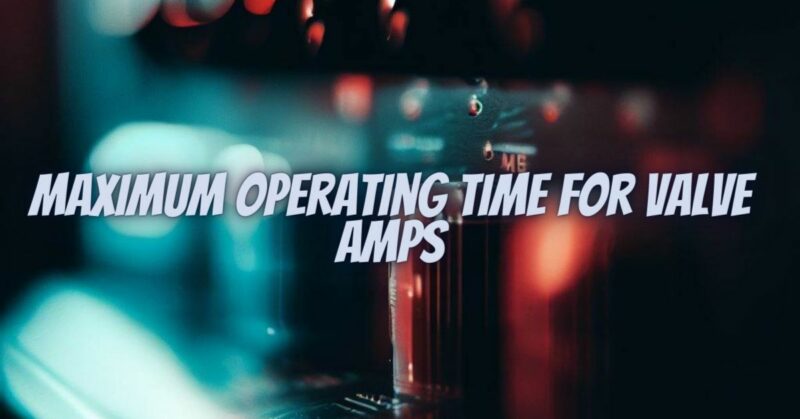Valve amplifiers, known for their warm and rich sound, have been a staple in the world of audio for decades. However, one aspect that demands careful consideration when using valve amplifiers is their maximum operating time. In this article, we will explore the factors that influence the operating time of valve amps, the importance of finding the sweet spot, and how to ensure the longevity of these beloved amplifiers.
Understanding Valve Amplifiers
Valve amplifiers, also known as tube amplifiers, employ vacuum tubes (electron tubes or thermionic valves) to amplify audio signals. These vacuum tubes contain a cathode, an anode (plate), and a control grid, and they operate based on the principle of thermionic emission. As electrons flow from the cathode to the anode, they generate heat, and this heat plays a crucial role in the operation and lifespan of valve amplifiers.
Factors Influencing Maximum Operating Time
- Tube Quality: The quality and type of vacuum tubes used in a valve amplifier significantly impact its operating time. High-quality tubes tend to have longer lifespans and can withstand extended use.
- Biasing: Proper biasing, which involves setting the tubes’ operating parameters, is essential. Incorrect biasing can lead to premature tube wear and reduced operating time.
- Cooling and Ventilation: Adequate cooling and ventilation play a vital role in maintaining the health of vacuum tubes. Proper airflow helps dissipate heat and prolong tube life.
- Usage Patterns: The manner in which a valve amplifier is used also affects its operating time. Continuous high-volume usage is more taxing on tubes than intermittent, moderate usage.
- Amp Design and Build Quality: The amplifier’s design and build quality influence its ability to manage heat and provide longevity. Quality components and proper circuit design contribute to a longer operating life.
Finding the Sweet Spot: Balancing Sound Quality and Longevity
- Moderation: Valve amplifiers have a sweet spot where they balance sound quality with longevity. Continuous operation at high volumes can lead to faster tube wear and reduced lifespan. Moderation in usage, avoiding prolonged high-volume sessions, can help maintain optimal performance and prolong tube life.
- Proper Biasing: Ensuring that your valve amplifier is correctly biased is crucial. Biasing sets the operating conditions for the tubes and greatly affects both sound quality and tube lifespan. Seek professional assistance if you’re unsure about biasing.
- Cooling and Maintenance: Regularly cleaning and maintaining your amplifier, including ensuring proper cooling and ventilation, can significantly extend its lifespan.
- Quality Tubes: Investing in high-quality vacuum tubes from reputable manufacturers can provide better performance and longer life. It’s essential to periodically check and replace tubes as they age and wear out.
Valve amplifiers are beloved for their timeless sound quality and unique warmth. To maximize their operating time, it’s vital to strike a balance between indulging in their sonic pleasures and taking steps to ensure their longevity. By following proper maintenance practices, using quality components, and moderating usage, audiophiles and musicians can continue to enjoy the enchanting sound of valve amplifiers for many years. A well-cared-for valve amplifier can be a faithful companion on the musical journey, offering the best of both worlds – exceptional sound and long-lasting performance.


